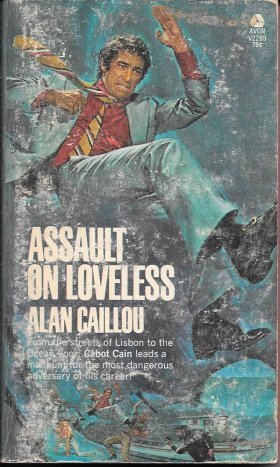I said promptly: “Nobody.”
He shook his head irritably: “I don’t believe that. I won’t believe it: It doesn’t make sense. No sense at all!” He threw his head back and peered at me. “Just who are you, Cain?”
“An adventurer. Just as you are. Only perhaps I’m better at it.”
“And what do you expect to get out of this?”
“Money, what else?”
“There’s easier ways to make money. Lots of them.”
I said with just the right amount of eagerness: “And maybe I’d like to be a sort of king too. You know the fear of plague in Africa, and man with a few vials of that stuff in his pocket can rule the whole goddamn continent. How much toxin have you got?”
“Four ounces.” Check.
“Any man with four ounces of that stuff, in the Nubian desert, is a king, an emperor, with all the power in the world.”
“You’re pushing me, Cain.”
“Sorry. I guess I’m just eager.”
The irritation was coming back again. He said, his eyes angry: “I know better than to trust anybody! Particularly someone with as smooth a tongue as yours.”
I said: “You trust Van Reck, don’t you? And Histermann?”
He said coldly: “No. They’d either of them sell me out if you made it worth their while.”
“I doubt it. Histermann held back a few things even when he thought he was about to die, horribly.”
“Yes, yes, I guess he’s all right, really.” It was a grudging admission.
I looked up at Van Reck. He was still sitting there as immobile as a statue, his bow ready still. I said: “Does he really find that thing more efficient than a gun?”
Loveless shrugged. “Every man to his own favorite weapon, it’s one of my rules” He laughed. “That’s what started all this, really. Do you realize that’s the oldest form of chemical warfare there is? The poisoned arrow? All I’m doing is refining a process that Africa’s known about, and used, for three thousand years. They used strychnine—I use botulin.”
“Ironic, isn’t it?”
He said grumpily: “If that’s all you’ve got to think about...”
“I was thinking it’s about time you made up your mind. I don’t want to stay here all night.”
He looked surprised, “All night? Till we pull out of here tomorrow, Cain. Till then, I’m not letting you out of my sight, or Van Reck’s either. I’ve got a lot of thinking to do, about you, and until I make up my mind you stay right there, where you are.”
I shrugged. “All right with me.”
Maybe it was a little too casual. He came quite close to me (with a quick, reassuring glance up at Van Reck), and said carefully:
“Just know this. If Histermann says there’s no one up there watching this place, then I know that’s how it is. It’d take more than a Portuguese cop to hide from him, I can tell you.”
It had to be constantly difficult, all the way down the line.
I said: “Not police, Fenrek’s men from Interpol. Only there aren’t any of them up there, not a single one. I told you.”
He said smoothly: “I keep telling you, Cain, don’t try to be too bright. Interpol only has one man here, and he’s a banker or something. Now there’s that Colonel Fenrek from Paris and nobody else. If they want a dozen men to prowl around the beaches in the dark, they have to use the local talent. Flatfoots.”
But not too constantly difficult. I gave way.
I sighed. “Yes, you’re right there, I suppose.”
He said unexpectedly: “Who was the girl you were with that night?”
Did he know already? I thought perhaps he did.
I said: “Colonel Fenrek’s niece, she’s here on holiday from the States. Why do I have to stay here all night? If I’m coming with you, I’d like to do a few things first.”
“I’ll bet you would.” He said angrily: “If you come with me, I don’t let you off the leash till we’re there. Everything you’ve got that I need, you’ve got it with you, in your head.”
I shrugged.
He said: “There’s less than an hour to daylight, and it takes longer than that to get this boat out of here, so we have to wait till dark tomorrow night. Say, another eighteen hours or so. I’ve just got one small job to do in Guincho, or maybe I’ll send Van Reck to do that. But meanwhile, if there’s the slightest sign that anyone’s coming looking for you, you know what I’m going to do, Cain?”
He reached down into the cupboard where the whalers sheets were stored and pulled out a small steel box, a box of finely-machined stainless steel, not much bigger than a pack of cigarettes. He opened it and took out a small glass vial. He held it up and let me see it. “I don’t have to tell you what this is, do I? I’ve got four of them. And somehow, anyone shows his face anywhere near this place, one of them’s going to get broken, and the hell with everything and everybody. I just don’t give one damn anymore.”
I didn’t like to mention to him that in less than an hour, Fenrek’s men would be blowing up the cave and everybody in it anyway, so I said nothing.
He put the vial carefully back into its box and said: “Now, you fixed that motor for me. Unfix it.”
I said: “Gladly. It’ll take a little time.”

























